Finding ways to wellbeing through community
This week's blog has been written by Associate Chaplain, Ali Newell.
During these strange COVID times it is so important to take care of ourselves, resting well, eating well, getting enough exercise and making sure we stay connected with friends and family.
Today, in this blog, I want to look at another aspect of wellbeing which can emerge when we reach out to find community across divides that often keep us apart. I want to tell the story of two Chaplaincy student groups who have found energy and life by reaching out to others and breaking down barriers. In both groups there has been a discovery that to open to another who might come from a different background of ethnicity, faith or age is to learn more about one’s self. In both groups, for the participants, it has been a journey of joy, discovery, meaning and new and lasting friendships. In this time of COVID with so much isolation it is heartening to witness this and see has often this leads to a sense of wellbeing for those involved.
First I will share the work of STTEPS, (Syrian Teenage Tutoring and Educational Programme) and then the work of the Coexistance Initiative, a new interfaith society at the Chaplaincy.

The background story to STTEPS (Syrian Teenage Tutoring and Educational Programme)
Scotland has committed to resettle 2000 Syrian refugees as part of the UK government Syrian Vulnerable Persons Relocation Scheme by 2020.
Of the newly arrived Syrian refugees over the course of the last 5 years, there are over 450 individuals resettled in Edinburgh that have come from refugee camps in Lebanon, Turkey, Jordan and Iraq. Amongst them, a group of 36 individuals are teenagers (12-18 years old). This group has had to endure severe hardships before arriving in Scotland. Many of them were denied education due to the difficulty of accessing educational facilities at the refugee camps. However, this same group have shown themselves to be amazingly resilient when given educational support to help integrate them into a new educational system in Scotland with a new language.
The Chaplaincy in co-operation with University student tutors and Dr Amer Masri from the Syrian Community in Edinburgh, launched a tutoring initiative 4 years ago that was first of its kind in Scotland and the UK. The initiative (composed of weekly two-hour tutoring sessions) is aimed at supporting the teenage Syrian refugees in their school subjects. Activities for the Syrian refugee tutoring scheme include practising English in conversation, studying written English and helping with homework in whatever subject the teenager brings to the session. The project promotes integration into schooling, encourages community engagement and helps the teenagers navigate adaptation to a new society. STTEPS also focuses on building confidence and self-esteem, and on nurturing supportive friendships both between teenagers and the tutoring peers.
During the Friday tutoring session, there is an opportunity to pick up on any difficulties or bullying that have occurred in the teenagers’ schools in Edinburgh and to follow this up by going into schools, speaking or writing to guidance teachers and offering support to the school, teenagers and families. This mediation on behalf of a teenager can improve relationships for all concerned.
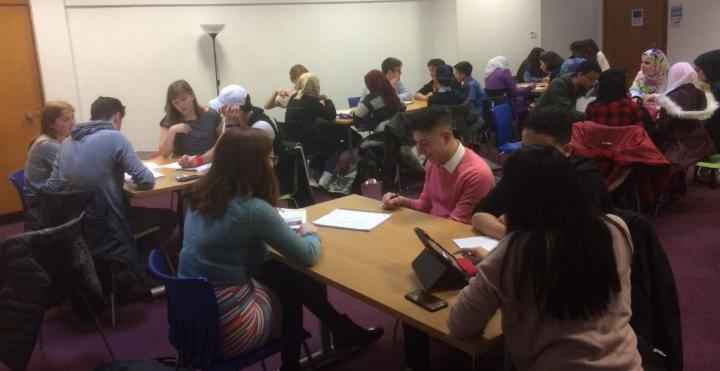
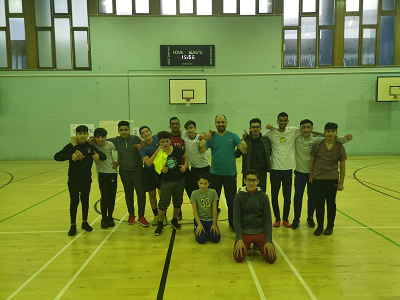
New developments last year
This past year 2019 -2020, the numbers increased to over 30 teenagers and a pool of over 50 tutors. Fun trips were organised on certain Saturdays; bowling, skating, trampolining, and visiting Deep Sea World. Dr Amer Masri, initiated a Syrian teenager football team and Chaplaincy worked with Sport and Exercise and Widening Participation to secure regular sessions of football in the Pleasance facilities.
One of our musical tutors, Jo Hill, who worked in refugee camps in the Middle East, facilitated a session of singing at the end of each tutoring session on Fridays. It was a source of laughter and harmony! Jo was gifted at putting the teenagers at ease and enabling the song that echoed through the Chaplaincy rooms.
And then came COVID!
Could the sense of wellbeing and community continue that was felt before? Could the community really continue online when before there was a physical sense of togetherness in the singing, tutoring side by side or going on trips to explore Edinburgh?
With a willingness to give it a try and the hard work of the tutors – yes! Since lockdown STTEPS has continued on zoom. And yes it has been challenging partly because not all the Syrian teenagers have the technology for the zoom sessions.
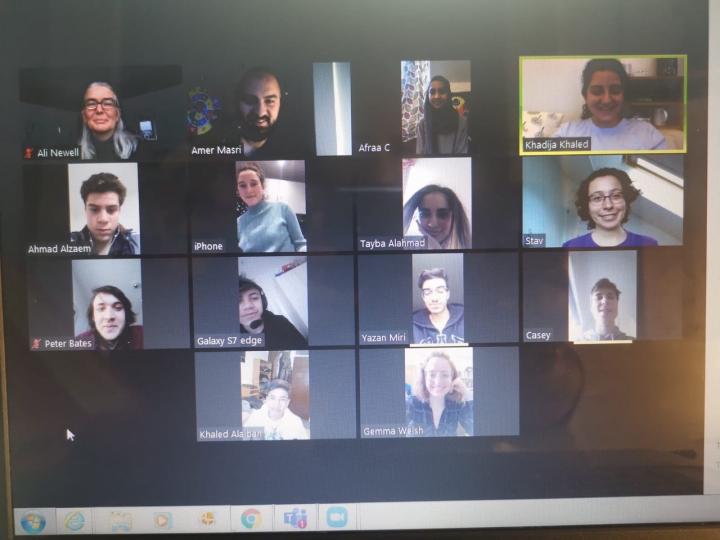
Fortunately, STTEPS were able to provide 24 teenagers last year with laptops with the help of the charity Remakery who refurbished old laptops for us.
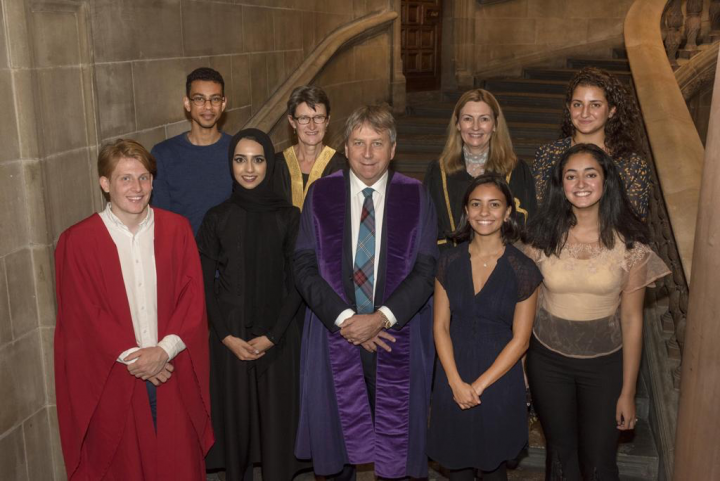
New ways forward
We now have an active group of new student tutors who have been trained online as well as a hardworking core organising group who work on the tutoring pairings every week, create online fun quizzes to begin the sessions, and operate the breakout rooms on zoom.
Esti Zaid, the student co-founder of the group, has looked after the training sessions online this term for the tutors which builds up their confidence in teaching. In time this leads to a sense of achievement and mutuality as the students learn to teach and also receive opportunities to learn Arabic with the teenagers!

The Edinburgh Coexistence Initiative was co-founded last by student Zain Hussain to provide a space for discussion for people of all faiths and none. It is the first Chaplaincy interfaith group at the University that has been run solely by students and it has been thriving for over a year.
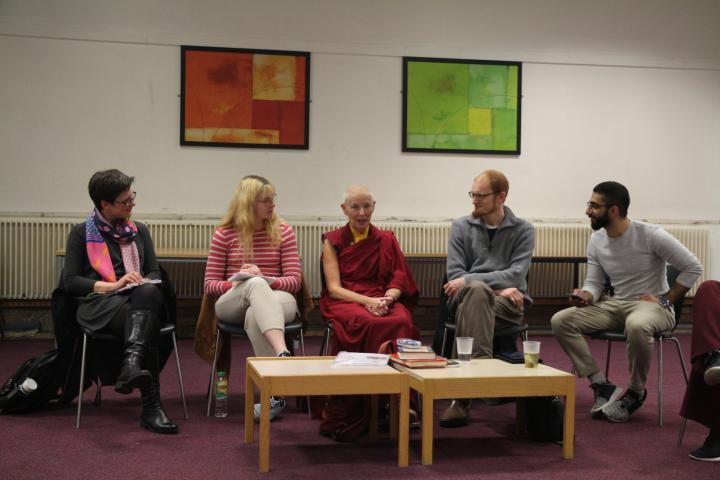
The first event of Coexistance of this semester was called ‘Sharing Religious Literature’ where the students hosted a virtual welcome circle and everyone shared a favourite passage from either religious literature, holy books or books which touched upon a religious/ interfaith experience.
‘The Future of Faith’ is the title of a series of events in which Coexistance have participated, in a fruitful collaboration with Edinburgh Interfaith Association and Interfaith Scotland over the summer and autumn.

One episode was called ‘Faith in Action’, a theme inspired by World Humanitarian Day. I include a link to the panel from Coexistance and elsewhere, where the students discussed the question:
‘How can humanitarian work, volunteering and community service from young people shape our future? How do we see communities rebuild, and support each other?’ https://www.facebook.com/EIFA.page/videos/1012628439190707
In the same series last week Coexistance members were streamed on Facebook Live with a programme called ‘From Protest to Progress’
Here is a link from the panel where they asked the question ‘How does faith inspire political action? What causes can we unite in, to build stronger, and more interconnected communities and countries at large?’ https://www.youtube.com/watch?v=dl8uVrKF10Q&list=PLLruLDNpBSr14aqeJNi6vUuZz8_n8y0Jx&index=4&ab_channel=EdinburghInterFaithAssociation
In the summer Coexistance hosted an Interfaith Pride Panel.

This was during Pride Month, and the online panel included academics and religious leaders from various backgrounds who shared their experiences of the interactions of LGBTQ+ themes and faith.
The panellists from Hindu, Jewish, Christian and Muslim traditions shared their visions of the space for LGBTQ+ members within their faith and community, as well as how their personal experiences have led their views to evolve over time.
In both STTEPS and in the Coexistance Initiative, wellbeing is found through sharing in community, delighting in diversity, breaking down barriers, and seeking to be inclusive and compassionate to others. The opportunities for this at the University are many and the students in these two groups have been inspiring in finding imaginative and creative ways to keep alive their vision through the COVID time of restrictions.
Ali Newell

